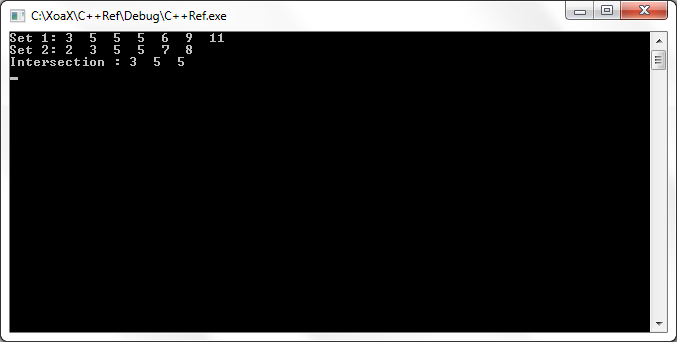algorithm - STL C++
set_intersection()
Declaration
template <class InIter1, class InIter2, class OutIter> OutIter set_intersection( InIter1 xFirst1, InIter1 xLast1, InIter2 xFirst2, InIter2 xLast2, OutIter xResult );
Description
This function finds the setwise intersection of the ordered of entries in the range starting from "xFirst1" up to the entry before "xLast1" and the ordered of entries in the range starting from "xFirst2" up to the entry before "xLast2." The function stores the intersection in the entries starting at "xResult" and continues up through entry before the return value. Note that the entries in each range must be sorted and sufficient storage must exist at "xResult" to fit the intersection. Also, the ranges may contain multiple copies of the same entry, which is not a set in the mathematical sense of the word. The overloaded version takes a comparison function, "xComp," and uses that to order entries instead of the less than.Header Include
#include <algorithm>
Overloads
template <class InIter1, class InIter2, class OutIter, class Pred> OutIter set_intersection( InIter1 xFirst1, InIter1 xLast1, InIter2 xFirst2, InIter2 xLast2, OutIter xResult, Pred xComp );
Example
#include <iostream>
#include <vector>
#include <algorithm>
int main()
{
using namespace std;
// Create two sorted vector instances
vector<int> qSet1;
qSet1.push_back(3);
qSet1.push_back(5);
qSet1.push_back(5);
qSet1.push_back(5);
qSet1.push_back(6);
qSet1.push_back(9);
qSet1.push_back(11);
vector<int> qSet2;
qSet2.push_back(2);
qSet2.push_back(3);
qSet2.push_back(5);
qSet2.push_back(5);
qSet2.push_back(7);
qSet2.push_back(8);
// Create a third vector for the result
vector<int> qIntersect(10);
// Output set 1 and set 2
vector<int>::iterator qIter;
cout << "Set 1: ";
for (qIter = qSet1.begin(); qIter != qSet1.end(); ++qIter) {
cout << *qIter << " ";
}
cout << endl;
cout << "Set 2: ";
for (qIter = qSet2.begin(); qIter != qSet2.end(); ++qIter) {
cout << *qIter << " ";
}
cout << endl;
// Take the setwise intersection
vector<int>::iterator qResult;
qResult = set_intersection(qSet1.begin(), qSet1.end(),
qSet2.begin(), qSet2.end(), qIntersect.begin());
// Output the setwise intersection
cout << "Intersection : ";
for (qIter = qIntersect.begin(); qIter != qResult; ++qIter) {
cout << *qIter << " ";
}
cout << endl;
// Keep the window open
cin.get();
return 0;
}Output

© 2007–2024 XoaX.net LLC. All rights reserved.
